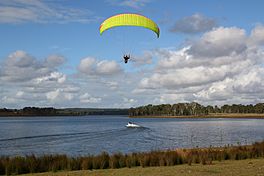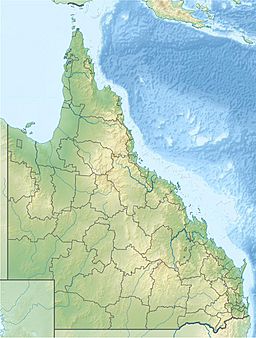Bjelke-Petersen Dam facts for kids
Quick facts for kids Bjelke-Petersen Dam |
|
|---|---|

Parasailing on Lake Barambah, 2014
|
|
| Location | 10 km (6.2 mi) east of Wondai, Queensland |
| Coordinates | 26°18′13″S 151°58′38″E / 26.3036°S 151.9772°E |
| Type | reservoir |
| Primary inflows | Barker Creek |
| Basin countries | Australia |
| Surface area | 2,250 ha (5,600 acres) |
| Water volume | 134,900 ML (4,760×106 cu ft) |
| Surface elevation | 307.3 m (1,008 ft) |
The Bjelke-Petersen Dam is a large dam located in Moffatdale, close to Cherbourg in the South Burnett Region of Queensland, Australia. This dam holds back the waters of Barker Creek, creating a big lake called Lake Barambah. It was named after Joh Bjelke-Petersen, who was the leader (Premier) of Queensland for many years. The dam is managed by a company called Sunwater.
About the Dam
The wall of the Bjelke-Petersen Dam is very long, stretching for 540 m (1,770 ft). It stands 34 m (112 ft) tall. The wall is built from earth and rocks, with a strong clay core inside. This design helps it safely hold back a massive 134,900 megalitres (4,760×106 cu ft) of water. Even though it holds a lot of water, the dam is generally not very deep. Barker Creek is the main source of water flowing into the dam. Other creeks like Four Mile Creek, Six Mile Creek, Frickey Creek, and Cattle Creek also feed into it.
Dam History
Work on the Bjelke-Petersen Dam started in 1984 and was completed in 1988. When the dam was finished, it created Lake Barambah. This lake was named after an old property in the area. The dam itself was named to honor the Queensland Premier, Joh Bjelke-Petersen. The dam's main job is to provide water to the South Burnett region. Most of this water is used by farmers to help their crops grow.
In the 1990s, the local council, which was then the Murgon Shire Council, took over managing the camping and fun activities at the dam. Later, in 2008, this council became part of the larger South Burnett Regional Council.
Around 2006, there was a very serious drought in Australia. This caused the dam's water levels to drop very low, to only 5% of its full capacity. With so little water, fewer visitors came to the dam. Local councils worried about having enough drinking water for nearby towns.
To keep the dam safe, SunWater, the company that runs it, began a project in 2007. They started upgrading the dam's spillway, which is like a safety valve for releasing excess water. This upgrade helps make sure the dam remains very safe for everyone.
Fun Things to Do
The Bjelke-Petersen Dam is a great place for visitors. It has lots of facilities for caravans, cabins, camping, and day trips. Usually, you can enjoy boating on the lake without many rules, except close to the dam wall.
There are two main places where you can launch your boat into Lake Barambah:
- Bjelke-Petersen Dam (West) (26°18′21″S 151°58′55″E / 26.3059°S 151.9820°E)
- Bjelke-Petersen Dam (East) (26°18′23″S 151°59′34″E / 26.3063°S 151.9928°E)
Both of these boat ramps are found on Haager Drive and are looked after by the South Burnett Regional Council.
Fishing in the Dam
The dam is a popular spot for fishing. It is regularly stocked with different types of fish. You can find bass, golden perch, silver perch, and southern saratoga here. Other fish like eel-tailed catfish, spangled perch, and bony bream also live in the dam naturally. If you want to fish, you need a special Stocked Impoundment Permit. Every October, there's a big fishing competition called the Bjelke-Petersen Dam Fishing Classic.
Sometimes, fish that are not supposed to be there, like sleepy cod and red-claw crayfish, have been introduced and are now breeding. In 2002, a type of fish called Tilapia started to become a problem. To stop their eggs and young fish from getting into the dam, special screens were put on the pipelines.


